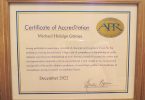APR: Public Relations’ Standard of Excellence
The Public Relations Society of America owns the first and most enduring critical thinking and skills examination of public relations practitioners: the Accredited in Public Relations designation (APR). Established as the public relations profession’s gold standard of performance excellence in 1964, today a Universal Accreditation Board (UAB) of veteran public relations leaders from diverse regions and industries administers a comprehensive written and oral assessment that has evolved with changes in communications technologies, business regulations, ethical standards and accepted public relations best practices.
Public relations practitioners who pursue APR standing show personal initiative by voluntarily stepping forward to be evaluated by a board of experts in order that a buyer of their services can be confident that they know public relations inside and out. Of the 20,000 members of PRSA nationwide — the first and largest national organization dedicated to this management discipline — approximately 20 percent merit the APR designation.
The Meaning of APR: Demonstrating Professional Integrity and Drive
When the UAB concurs that the senior-level public relations practitioner can be counted upon to effectively deliver managed communications solutions to advance an organizational mission, they bestow the Accredited in Public Relations credential. This validates the applicant professional’s years of hands-on public relations experience, strategic problem solving skills, language acuity, use of research, persuasive credibility and overall communications planning with resource management as would be a predictor of their future impact. The achievement of APR is neither easy nor a presumption of professional longevity, and like other professional certifications, requires an unending recertification commitment to keep the practitioner conversant with current approaches and technology innovations to recalibrate their knowledge for a changing communications landscape.
The APR is a practitioner’s professional values statement, avowing that they respect and aspire to the highest standards of their field. They are truthful and ethically bound, curious about new learning, aware of the global marketplace and committed to giving back not only to their profession but also to their larger society.
How Your Organization Benefits from an APR Colleague
Whether as an employer, client or agency partner of an APR-designated practitioner, your organization gains a proven communications strategist who can leverage their national network of fellow APRs. This brings your organization additional intellectual insights of expert APR advisers in broad areas of reputation management, organizational change, brand positioning and customer trust, as are often the goals of deliberate communications designed to influence relevant stakeholders. An APR counselor recognizes not only when to fortify their knowledge with another public relations specialist (e.g., financial relations, multiculturalism, crisis response, eco-capitalism, sports marketing, employee communications, etc.), but has the knowledge as how to qualify, manage and collaborate effectively with them.
APR could as easily stand for Accomplished Professional Record or Admirable Practitioner Reputation. This unique distinction removes all guesswork from the screening process when contemplating the contributed value which this individual portends to bring to your organization. An APR-certified public relations practitioner is comfortable as both a leader and agent of change, and has been found to possess the professional mettle, transferable experience, ingenuity and foresightedness to amplify your organization’s voice. They are a positive reflection of the organization they serve, and the profession they represent.
Co-authored by Loring Barnes, APR, managing principal, CLARITY Communications Group, LLC and John Deveney, ABC, APR, Fellow PRSA, president, Deveney Communication.
To learn more about Accreditation in Public Relations (APR), visit http://www.prsa.org/PD/apr/.







Having the APR credential along with my terminal educational degree also informs university administrators that I have professional and academic experience to share with my students. Higher education is another venue where PRSA can and should promote APR as a value-added credential for quality public relations education.
[…] strategist who can use leverage by knowing other accredited members. This is extremely beneficial to any organization because this offers intellectual insight of several APR members in varying areas such as reputation […]